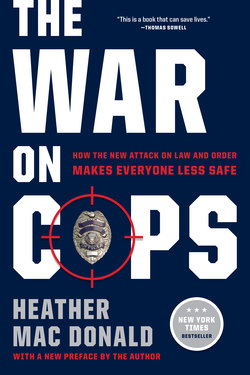Читать книгу The War on Cops - Heather Mac Donald - Страница 8
На сайте Литреса книга снята с продажи.
ОглавлениеPART ONE
Burning Cities and the Ferguson Effect
The August 2014 police shooting of Michael Brown in Ferguson, Missouri, spawned a narrative as stubborn as it was false: Ferguson police officer Darren Wilson had allegedly shot the 18-year-old “gentle giant” in cold blood while the latter was pleading for his life, hands raised in surrender. After Brown’s death, rioters torched and looted Ferguson businesses. The facts were that Brown, a budding criminal who weighed nearly 300 pounds, had punched Wilson in the face, tried to grab Wilson’s gun, and charged at him, leading Wilson to fire in self-defense.
In the months that followed, the lie that Brown had died in a racially motivated police execution was amplified by the media, college presidents, and the left-wing political class. The newly formed Black Lives Matter movement promoted the notion that black American males were being hunted down and killed with impunity by renegade white police officers. Eric Garner, who had died after a forceful police takedown on Staten Island, New York, was added to the list of martyrs to racist police brutality.
Riots broke out in Ferguson for a second time in November 2014 when a grand jury declined to indict Wilson for Brown’s death. Black Lives Matter protests grew ever more virulent as a second myth took hold: that the American criminal-justice system is rigged against blacks. In December 2014, Ismaaiyl Abdullah Brinsley assassinated Officers Wenjian Liu and Rafael Ramos of the New York Police Department in retaliation for the deaths of Garner and Brown. Police actions in minority neighborhoods became increasingly tense; suspects and bystanders routinely challenged officers’ lawful authority.
Slandered in the media and targeted on the streets, officers reverted to a model of purely reactive policing that had been out of vogue since the early 1990s. The inevitable result? Violent crime surged in city after city, as criminals began reasserting themselves—a phenomenon that I and others controversially described as the “Ferguson effect.” President Barack Obama’s FBI director, James Comey, confirmed the Ferguson effect in a speech at the University of Chicago Law School in October 2015. The rise in homicides and shootings in the nation’s 50 largest cities was likely due to the “chill wind blowing through American law enforcement over the last year,” he said, a wind that “is surely changing behavior.” Sadly, the president himself contributed directly to that chill wind against the nation’s police forces.
